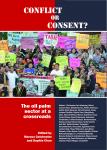
'Conflict or Consent?' Chapter 15: SG Sustainable Oils Cameroon PLC (SGSOC) in South West Cameroon
16 Dec 2013
This is the fifthteenth chapter of 'Conflict or Consent? The oil palm sector at a crossroads'.On 17th September 2009, SG Sustainable Oils Cameroon PLC (SGSOC) signed a contract with the Cameroonian government to develop a large industrial oil palm plantation and refinery. SGSOC is 100% owned by the American company Herakles Farms, an affiliate of Herakles Capital, an Africa-focused private investment firm involved in the telecommunications, energy, infrastructure, mining and agroindustrial sectors.SGSOC's project has been the subject of great controversy over the last two years. Local communities, conservation groups, and NGOs have expressed opposition to the project due to its numerous negative social and environmental impacts. However, Herakles claims the project will contribute to socio-economic development and environmental protection. Yet in September 2012, the firm withdrew their application for membership of the RSPO in reaction to a formal complaint lodged against them and widespread criticism of their project.



